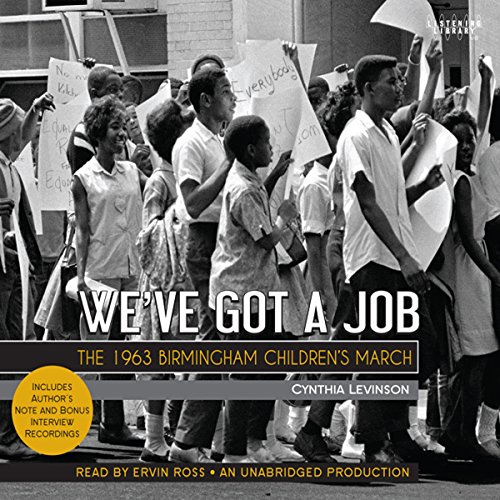-
We've Got a Job: The 1963 Birmingham Children's March
Cynthia Levinson
Paperback (Peachtree Publishing Company, Feb. 1, 2015)The inspiring story of one of the greatest moments in civil rights history seen through the eyes of four young people at the center of the action.The 1963 Birmingham Children’s March was a turning point in American history. In the streets of Birmingham, Alabama, the fight for civil rights lay in the hands of children like Audrey Hendricks, Wash Booker, James Stewart, and Arnetta Streeter. We’ve Got a Job tells the little-known story of the 4,000 black elementary, middle, and high school students who voluntarily went to jail between May 2 and May 11, 1963. The children succeeded ―where adults had failed―in desegregating one of the most racially violent cities in America.By combining in-depth, one-on-one interviews and extensive research, author Cynthia Levinson recreates the events of the Birmingham Children’s March from a new and very personal perspective. Y
Y
-
We've Got a Job: The 1963 Birmingham Children's March
Cynthia Y. Levinson, Ervin Ross, Listening Library
Audiobook (Listening Library, Aug. 28, 2012)By May 1963, African Americans in Birmingham, Alabama, had had enough of segregation and police brutality. But with their lives and jobs at stake, most adults were hesitant to protest the city’s racist culture. Instead, children and teenagers - like Audrey, Wash, James, and Arnetta - marched to jail to secure their freedom. At a time when the civil rights movement was struggling, Birmingham’s black youth answered Dr. Martin Luther King’s call to “fill the jails” of their city. In doing so, they drew national attention to the cause, helped bring about the repeal of segregation laws, and inspired thousands of other young people to demand their rights. Combining extensive research and in-depth interviews with protesters, Cynthia Levinson recreates the events of the Birmingham Children’s March from a new and very personal perspective. PLEASE NOTE: When you purchase this title, the accompanying PDF will be available in your Audible Library along with the audio.
-
We've Got a Job: The 1963 Birmingham Children's March
Cynthia Levinson
Hardcover (Peachtree Publishing Company, Feb. 1, 2012)The inspiring story of one of the greatest moments in civil rights history seen through the eyes of four young people at the center of the action.The 1963 Birmingham Children’s March was a turning point in American history. In the streets of Birmingham, Alabama, the fight for civil rights lay in the hands of children like Audrey Hendricks, Wash Booker, James Stewart, and Arnetta Streeter. We’ve Got a Job tells the little-known story of the 4,000 black elementary, middle, and high school students who voluntarily went to jail between May 2 and May 11, 1963. The children succeeded ―where adults had failed―in desegregating one of the most racially violent cities in America.By combining in-depth, one-on-one interviews and extensive research, author Cynthia Levinson recreates the events of the Birmingham Children’s March from a new and very personal perspective. Y
Y
-
We've Got a Job: The 1963 Birmingham Children's March
Cynthia Levinson
eBook (Peachtree Publishing Company, Sept. 15, 2018)The inspiring story of one of the greatest moments in civil rights history seen through the eyes of four young people at the center of the action.The 1963 Birmingham Children’s March was a turning point in American history. In the streets of Birmingham, Alabama, the fight for civil rights lay in the hands of children like Audrey Hendricks, Wash Booker, James Stewart, and Arnetta Streeter. We’ve Got a Job tells the little-known story of the 4,000 black elementary, middle, and high school students who voluntarily went to jail between May 2 and May 11, 1963. The children succeeded —where adults had failed—in desegregating one of the most racially violent cities in America.By combining in-depth, one-on-one interviews and extensive research, author Cynthia Levinson recreates the events of the Birmingham Children’s March from a new and very personal perspective.
-
We've Got a Job: The 1963 Birmingham Children's March
Cynthia Y. Levinson, Ervin Ross
Audio CD (Listening Library (Audio), Aug. 28, 2012)By May 1963, African Americans in Birmingham, Alabama, had had enough of segregation and police brutality. But with their lives and jobs at stake, most adults were hesitant to protest the city’s racist culture. Instead, children and teenagers—like Audrey, Wash, James, and Arnetta— marched to jail to secure their freedom. At a time when the civil rights movement was struggling, Birmingham’s black youth answered Dr. Martin Luther King’s call to “fill the jails” of their city. In doing so, they drew national attention to the cause, helped bring about the repeal of segregation laws, and inspired thousands of other young people to demand their rights. Combining extensive research and in-depth interviews with protesters, Cynthia Levinson recreates the events of the Birmingham Children’s March from a new and very personal perspective. Z
Z
-
We've Got a Job: The 1963 Birmingham Children's March by Cynthia Levinson
Cynthia Levinson
Hardcover (Peachtree Publishers, 2012, )We've Got a Job: The 1963 Birmingham Children's March by Cynthia Levinson [Pe... Y
Y
-
We've Got A Job: The 1963 Birmingham Children's March
Cynthia Levinson
Library Binding (Turtleback, Feb. 1, 2015)FOR USE IN SCHOOLS AND LIBRARIES ONLY. We've Got A Job tells the little-known story of the 4,000 black elementary, middle and high school students who voluntarily went to jail in Birmingham, Alabama, in May 1963. Fulfilling Mahatma Gandhi's and Dr. Martin Luther King, Jr.'s precept to ""fill the jails,"" the students succeeded in desegregating one of the most racially violent cities in America. The astonishing events surrounding the Children's March are retold here from the perspectives of four of the original participants. Y
Y